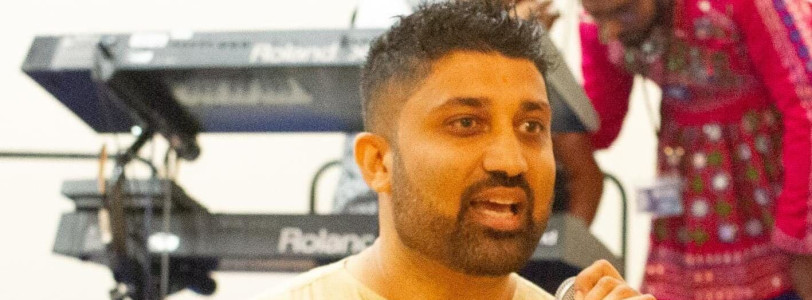Could you first introduce yourself to the reader?
I am Hanuman Dass, founder of the UK-based charity Go Dharmic (GD). Our core mission is global hunger relief, supported by our humanitarian crisis response work and campaigns for environmental action, poverty alleviation,education, and plant-based and organic diets. Go Dharmic's founding ethos is based on the philosophy of Sanatana Dharma. Our mission is to “Love All. Feed All. Serve All.”
Why did you first decide to set up Go Dharmic?
I was in my mid-20s and working in central London as a trader. I was very happy. I had met the person who would eventually become my wife and the financial markets were doing well. But every day I would go to the centre of London and see hundreds of people suffering with homelessness. These people were alone, cut off from the community and hungry. I found I had a spiritual duty to help, and GD was born after I met the Harvard professor Ram Dass.
What does your job involve? Give us the typical outline of a day?
I get up at 5am. At 6:30, I have my first phone calls and online meetings. From 10 until 4, I come into the office for face-to-face meetings with potential or existing GD partners to expand GD’s operations. Then, I head to one of GD’s food distributions. About once a week, I deliver a talk on Dharma for social and environmental causes. I also travel a lot to extend GD’s reach. GD wants to bring about a more compassionate world. I also find time to write the many books I have in progress.
What’s great about your job?
Being able to spread love and compassion is always rewarding. It uplifts both the provider and the beneficiary. I get to see lives changed for the better on a long-term basis. I see volunteers come up with new ways to provide food security and education, and protect our environment. I am surrounded by great innovation, great dedication and great love, and that is truly meaningful. GD is proof that ideas rooted in Hindu philosophy – like ahimsa (non-harming), satyam (truth), karuna (compassion), and seva (selfless service) – have a universal application and can serve as a foundation for the wellbeing of all.
What are the bits you don’t like or find challenging?
Charity workers are not given the same respect as professionals in other fields. They often have a more difficult job than working in IT or financial services, for example, and for less pay, but that is often not appreciated enough.
What are the highlights of your career to date?
Through GD, serving over 15 million meals across the globe, planting more than 150,000 mangroves in the Sundarbans, developing more than 105 libraries across India and distributing over 300 digital education licences, mobilising 10,000 GD volunteers, building 50 sanitation facilities in India, and performing disaster relief in Ukraine, Turkey-Syria, and Africa. The highlight overall is being able to represent the values of Sanatana Dharma to the world.
Have you noticed any changes in the charity sector? If so, what?
Fundraising has become even more challenging since we began. Businesses are struggling and charities will, of course, face difficulty because of that.
And looking more specifically at the work Go Dharmic does, have you observed any changes to the types of people you’re working with, both volunteers and those the charity benefits?
In the cost of living crisis, we have seen a rise in beneficiaries attending our food distributions. People and families have been choosing between heating their homes and eating. I have seen more young people become volunteers. The younger generation are especially sensitive to food insecurity, social inequality, and environmental damage. I think humanity is becoming more self-aware. The future looks bright and full of love.
Is there an end-point for the charity? As in, do you think the work your charity and others are doing will ever result in the eradication of the problems you’re seeking to address?
Working together, partnering, that’s the key. GD recently partnered with Tony Robbins’s 100 Billion Meals initiative. Obviously that’s a huge number of meals to commit to, and it’s only really possible by different people and organisations joining hands. The UN Sustainable Development Goals are a collaborative effort. Only by governments, businesses and individuals working together can the UN achieve their target of establishing these goals by 2030. I do foresee a day when we are kinder to our planet, when everyone is given a strong education with ample opportunities before them, and food security. But, the task of living and breathing love, of right living, is one that will remain with us as long as we are agents in the world.
You’ve also written or co-authored a number of books. Can you tell us about them?
I have co-written three books with Dr. Nicholas Sutton: The Power of Dharma; Pearls of Wisdom from Hinduism; and Moving Mountains. They express the essence of Hindu philosophy, of Sanatana Dharma (the eternal and universal purpose of life). This purpose is ultimately love. They are about cultivating love for all beings.
What was your career path into this job?
I used to be a trader. I worked in the City. But there was a spiritual vacuum in my heart. There were problems in the world, and spending my life making money seemed wrong. I went with a friend and distributed fruit to people struggling with homelessness. Then I did it again with a small banner saying “Love All. Feed All.” Then I came back with friends offering hot drinks. From there it just expanded to hot food and new locations, new challenges (environmental, educational, social and so on) and Go Dharmic was founded.
How has your background, upbringing and education had an impact on your career choice?
I wouldn’t describe my work as a career choice, but as a vocation. I felt a call to live a life of dharma, of love and compassion. This doesn’t just come from my family’s past, but is something that lives in all people. The call to be loving to all beings is universal. My business education and work as a trader have given me the skill set to form corporate partnerships and extend GD’s operations. However, the foundation is an awareness of peace and love.
Did you have any role models or inspirations growing up?
Neem Karoli Baba (Maharajji) and Ram Dass were my spiritual teachers and inspiration. They lived and breathed love with every breath. Maharajji told me: “Love all, feed all, serve all, and remember God.”
Can you describe your biggest challenge so far in your career? How did you overcome it?
When the Covid Delta variant hit India, the entire team was working 18 hours a day to save lives. We overcame it with very passionate and innovative volunteers. We provided critical support by partnering with Uber. They helped transport oxygen cylinders to under-resourced hospitals in India, and provided free rides to UK volunteers to deliver emergency food parcels to vulnerable persons.
And what is the biggest challenge to the charity sector, do you think?
The changes in the technology sector. The ability to use AI and data is becoming pivotal in the life of a charity. Charities will need well-trained tech specialists to be able to function effectively. It’ll be a huge challenge. Tech will perform a vital role in future fundraising and operations.
Have you had a mentor anytime during your career, and if so, how has having one made a difference?
I had the fortune of studying with Ram Dass over several periods. He showed me how to live peacefully and happily. He gave me the spiritual name of ‘Hanuman Dass’, as a servant of Hanuman and expression of love and selfless service. He helped me understand how to live a unified life for myself, for my family, and for the wider world around me. I am forever grateful for his teaching.
You’ve been granted the ability to send a message to 16-year-old you. What do you say?
Learn Sanskrit and study the Upanishads, the Vedas, the Bhagavad Gita, the Ramayana, and the Mahabharata. Read Ram Dass’s Be Here Now. These will help you live more conscientiously. Spend time volunteering to help others and the world around you.
Do you have any advice for young people interested in doing your kind of job?
Volunteer. Just dedicate some time to serving someone less fortunate, or planting a tree, or teaching someone. Start with a small act of kindness. Suddenly, lots of small acts of kindness amount to big changes. There is a beautiful story of Sudama offering Krishna the small amount of rice that he had, but because it was offered with real love and care, Krishna accepted it with joyful tears.
Finally, where can people find out more about you and your work?
They can follow me on social media under Hanuman Dass, and keep up to date with Go Dharmic’s latest work on social media, the Go Dharmic website (www.GoDharmic.com), or through the Go Dharmic app.
Social Media, Hanuman Dass:
- http://linkedin.com/in/hemalranderwala
- https://twitter.com/hanumandassgd?s=21
- https://instagram.com/hanuman_dass?igshid=NTc4MTIwNjQ2YQ==
- https://www.facebook.com/hanumandass1008/?locale=en_GB
Social Media, Go Dharmic:
- https://www.linkedin.com/company/go-dharmic/
- https://twitter.com/godharmic?s=21
- https://instagram.com/godharmic?igshid=NTc4MTIwNjQ2YQ==
- https://m.facebook.com/godharmic









0 Comments